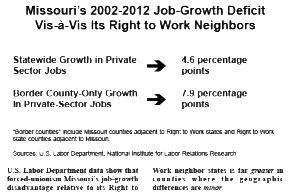Will Team Biden Weaponize Workers’ Pensions?
Big Labor abuse of worker pension and benefit funds as a means of advancing union bosses’ self-aggrandizing policy objectives is a familiar phenomenon.
Border-County Evidence Indicates Forced Unionism’s the Culprit
(click to download newsletter)
This year, grass-roots proponents of making Missouri America’s 25th Right to Work state are facing off against union officials and other supporters of the current policies that empower Organized Labor to get employees fired for refusal to bankroll a union they don’t want, and never asked for.
The battle is fundamentally over a matter of principle. Should private organizations — labor unions specifically — have the legal power, either explicit or tacit, to tax people who don’t wish to join them?
Most Missouri citizens say “no,” while union bosses and their allies say “yes.” But economic considerations are also playing an important role in the debate.
 Geographic Economic Factors ‘About the Same on Both Both Sides of a Border’
Geographic Economic Factors ‘About the Same on Both Both Sides of a Border’
Pro-Right to Work Missourians can point to a wide array of government data showing that long-term economic growth is substantially faster in the six Right to Work states neighboring Missouri than it is in the “Show Me” State and its non-Right to Work neighbors.
For example, from 2002 to 2012, according to the U.S. Labor Department, statewide private-sector payroll employment in Right to Work Iowa, Nebraska, Kansas, Oklahoma, Arkansas and Tennessee collectively increased by 3.0%, compared to a 1.6% decline for Missouri.
But to get a clearer picture of whether slower multi-year economic growth in Missouri relative to its Right to Work neighbors stems from policy differences, rather than other factors, it makes sense to look only at the border counties, rather than the entire states.
As then-University of Minnesota economist Thomas Holmes observed in a brief analysis of the economic impact of Right to Work laws published in 1998, geographic economic determinants such as “climate and access to transportation” are “about the same on both sides of a border between states . . . .”
When only data from counties located directly on both sides of the Missouri border are considered, the long-term job-growth advantage held by the “Show Me” State’s Right to Work neighbors is substantially wider than what is revealed by statewide data.
Following Dr. Holmes’ reasoning, the disparity suggests that the overall edge Right to Work Iowa, Nebraska, Kansas, Oklahoma, Arkansas and Tennessee hold over forced-unionism Missouri is primarily a consequence of public-policy differences.
To be precise, U.S. Labor Department data show that, from 2002 to 2012, total private-sector payroll employment in the 33 Missouri counties bordering Right to Work states (including Clark and New Madrid, which also border forced-unionism states) fell by 2.3%.
Over the same period, the total private-sector payroll employment for the 39 Right to Work state counties bordering Missouri (with the exclusion of lightly-populated Ringgold County, Iowa, for which 2012 annual data are not yet available) increased by 5.6%.
Forced Union Dues Bankroll Political Support For Higher Taxes, Heavier Regulation
In an article for National Review Online last summer concerning economic competition among the states, financial analyst Kevin Williamson devoted his opening sentences to the Kansas City metropolitan area, which encompasses multiple counties in forced-unionism Missouri and Right to Work Kansas.
Mr. Williamson cited data showing how the Right to Work portions of the Kansas City metropolitan area were “eating the economic lunch” of the forced-unionism portions:
“Kansas City saw about 9,500 new jobs created between May 2012 and May 2013 — every one of them on the Kansas side of the border . . . .”
National Right to Work Committee Vice President Matthew Leen added:
“While Keith Williamson singled out superior tax, spending and regulatory policies, rather than Right to Work, as the sources of the Kansas jurisdictions’ accelerated job creation, the fact is that Right to Work is strongly correlated with a wide array of pro-growth fiscal and regulatory policies.
“Moreover, there is ample reason to believe that Right to Work laws actually foster less burdensome taxes and regulations, because Big Labor is undoubtedly the most powerful lobby for heavier taxation and regulation.
“Wherever union officials maintain compulsory-dues privileges, the Tax-and-Spend lobby inevitably wields far more clout.
“Consequently, grass-roots activists who continue turning up the heat on elected officials to enact Right to Work legislation are fully justified in claiming that, based on the best available evidence, banning compulsory union dues and fees would be very good for Missouri employees and businesses.”

Big Labor abuse of worker pension and benefit funds as a means of advancing union bosses’ self-aggrandizing policy objectives is a familiar phenomenon.

Leaked CTU Proposals Won’t Do Anything to Improve Schools’ Poor Performance

What impact does handing a union monopoly power to deal with your employer on matters concerning your pay, benefits, and work rules have on your pay?